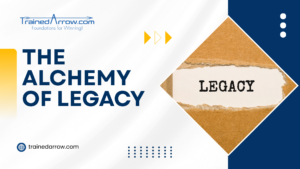
The Alchemy of Legacy … the soul-print we can leave in a fast-moving world!
In earlier times, life was simple. The past used to be with us. Families passed down not just names, but stories, values, and wisdom. The
![]()
After extensive experience in Senior Executive Leadership roles in Business Development, Marketing and Pricing, and IT functions in India and Asia, I was offered an opportunity in the US in the late nineties to work for global firms in areas of Business & Technology intersection & Strategy Consulting. I knew it meant re-inventing myself if I were going to demonstrate my ability to exceed expectations. As such, I set out to continue applying the principles of success that I have learned along the way. Before too long, opportunity knocked again and I was faced with the opportunity to work with the “CIO.”
In the years that followed, I have worked and interacted with many IT leaders and CIOs that were, at best, IT experts who were no more than glorified “gear-guys” and “do-it-yourselfers”. Few, who were bureaucratic-minded who knew anything about how information was processed and how its value enhanced a business. Quite a few CIOs were also, unwittingly, glorified project/program managers, budgeting (cost-control) experts, vendor managers, etc in light of how the IT work was considered for outsourcing.
I have also seen a few leaders who represented the “I” in their CIO title filling with, however, mostly one of the following: “Infrastructure”, “Integration”, “Intelligence” and very few though with “Innovation” and “Information”. Yet rare to see someone who really embodied all the “I”s to be a more complete CIO. The reason for this, apparently, was that Information Technology had long been an ‘enabler’ or supporter function more linked to the operational capabilities of a business than ever those “I”s in the CIO title have emerged as a cohesive need.
Much of this has changed over the years just as IT shifted to becoming the business platform itself. And the CIO role too has morphed as a business leader to be more customer-oriented to lead the function as a ‘business builder’ along with other business leadership roles and not just to support operational excellence warranted to running a business.
This presupposed that a CIO is a well-rounded “Business Architect” with a technology bent of mind to ‘baby-sit’ overall business strategy planning into IT strategy. A leader who can also operationalize all the “I”s under the CIO umbrella function; clearly establish ‘monetization of the experience’ and derivative business value. Leverage from the informational components from clouds, mobility, big data, and social media to leverage and serve up to enterprise architecture (including Technical, Application, Data, and Digital architectures) and connect with the ‘publics’ of the business.
More succinctly, the CIO role has emerged to be a “Chief-more-than-information-Officer” since the businesses are demanding vision, business acumen, and people skills from their CIOs. The CIO is a business strategist, IT functional strategist, implementation leader, technology advocate, and change agent, all in one! HR leaders must realize this and re-write their job descriptions befitting these new realities!

In earlier times, life was simple. The past used to be with us. Families passed down not just names, but stories, values, and wisdom. The
![]()

Okay, listen up. We’re all chasing the next big tech flex and the fastest quarterly win. But what happens when the founder retires, or the
![]()

Can you? Read this short story: A senior leader who once worked closely with the Reliance Group of India shared this story with me –
![]()
We are passionate about people development and transformation. Our courses are designed for: College Graduates, Corporate Employees, and Entrepreneurs. Interested?
trainedarrow@samprad.net
+1-609-658-3053